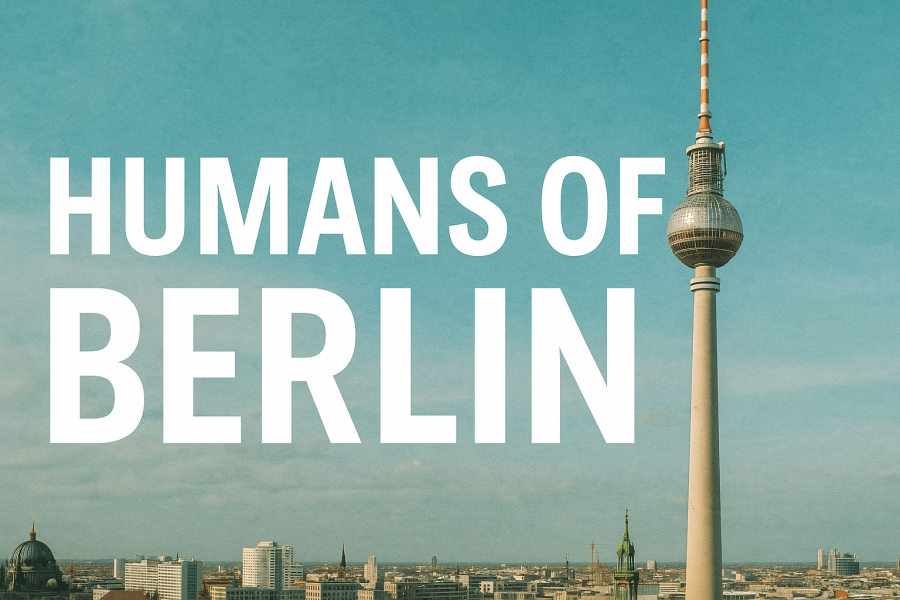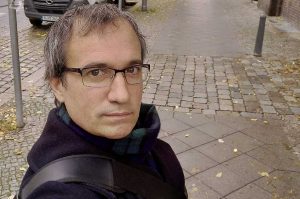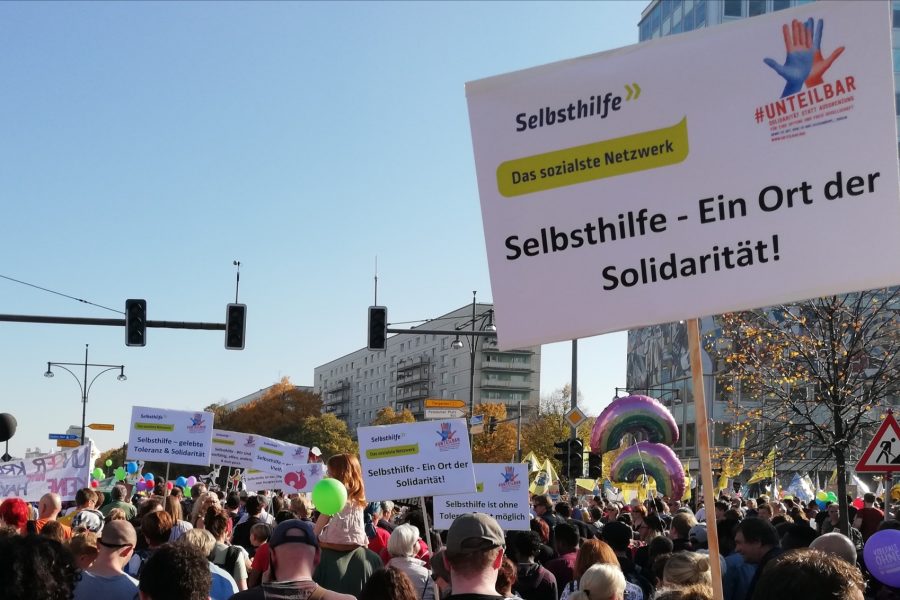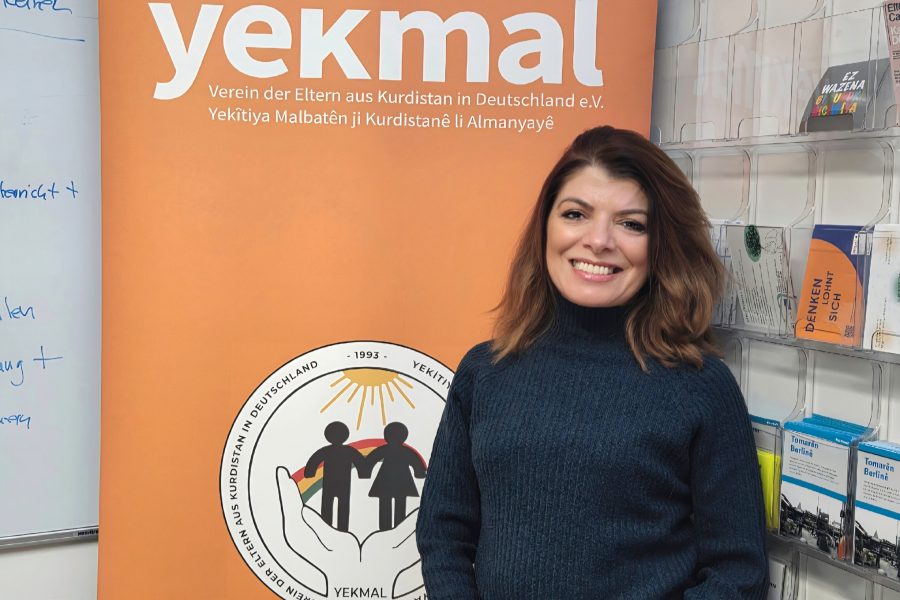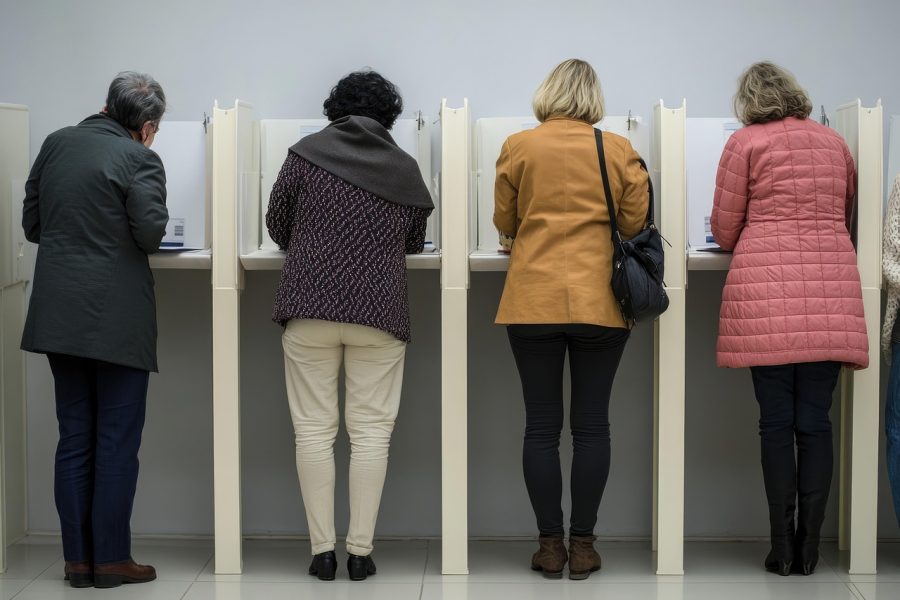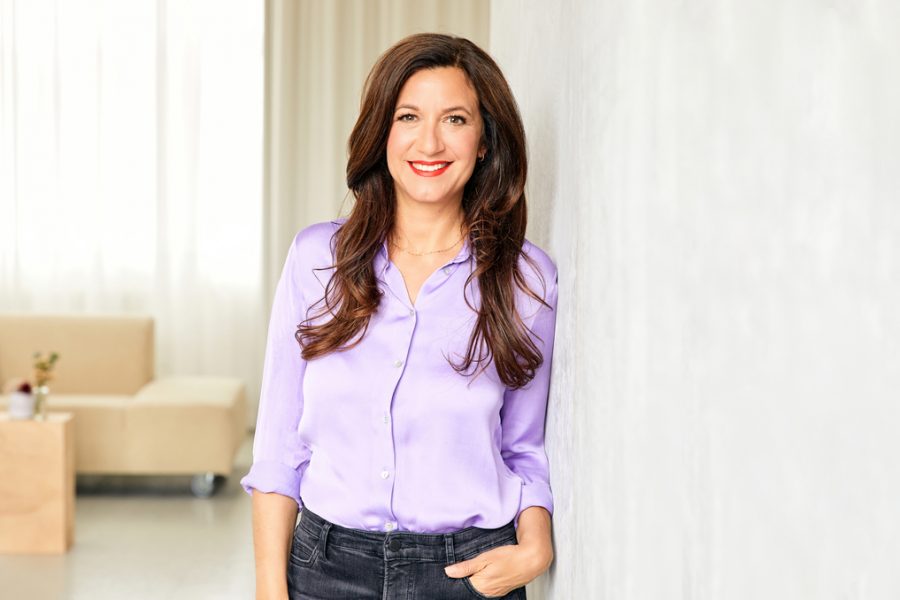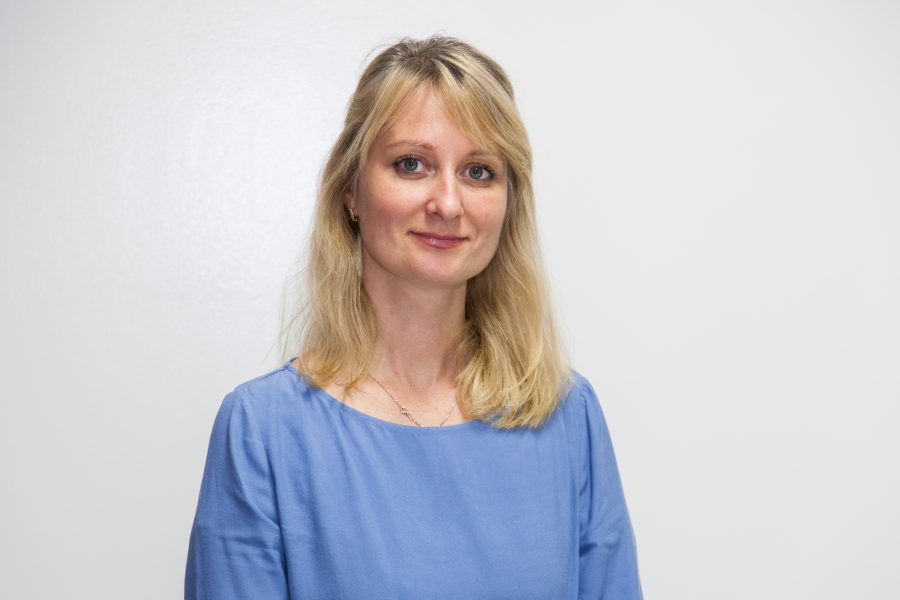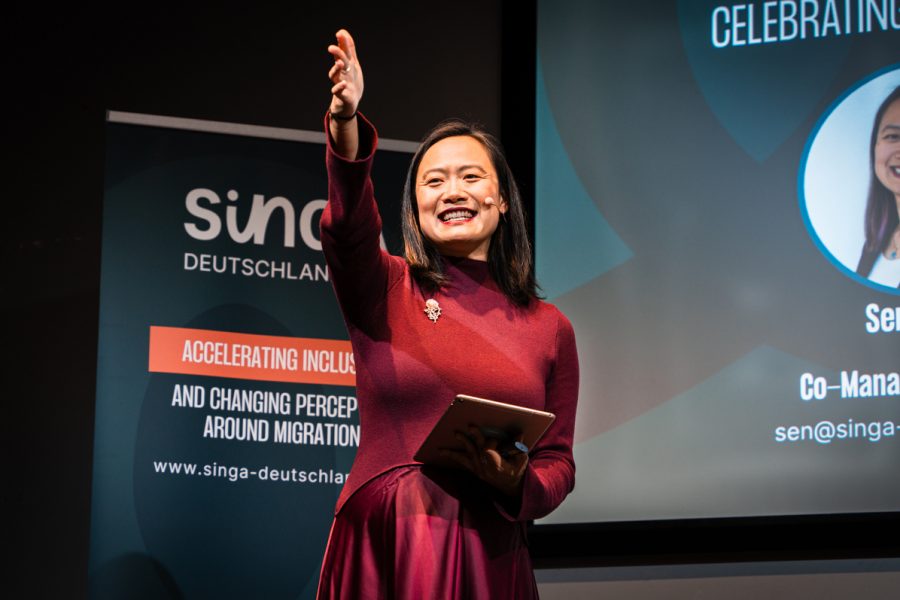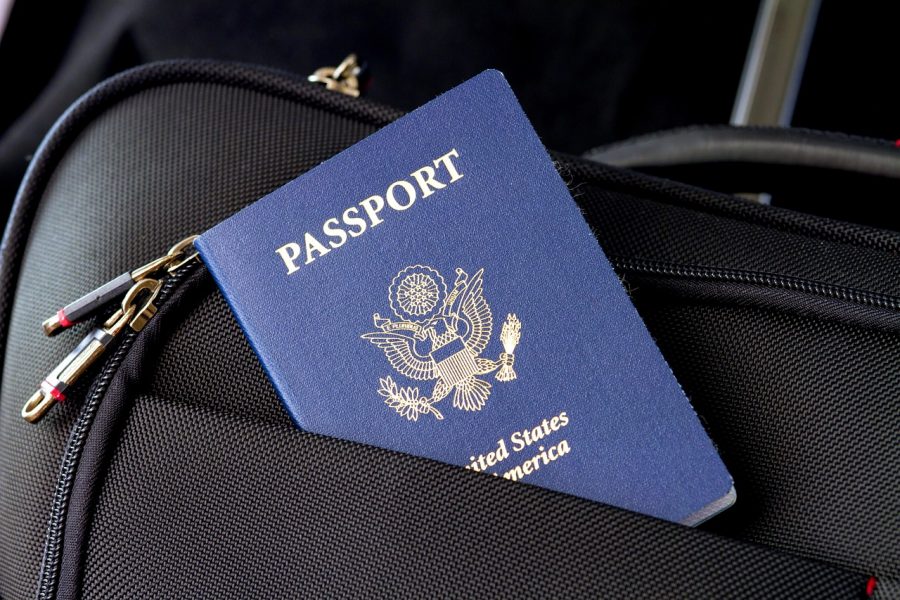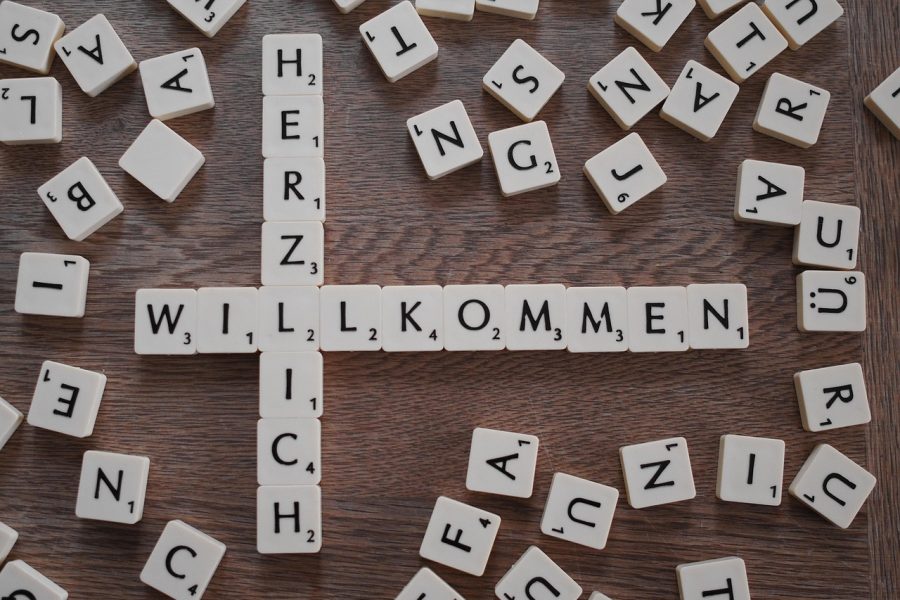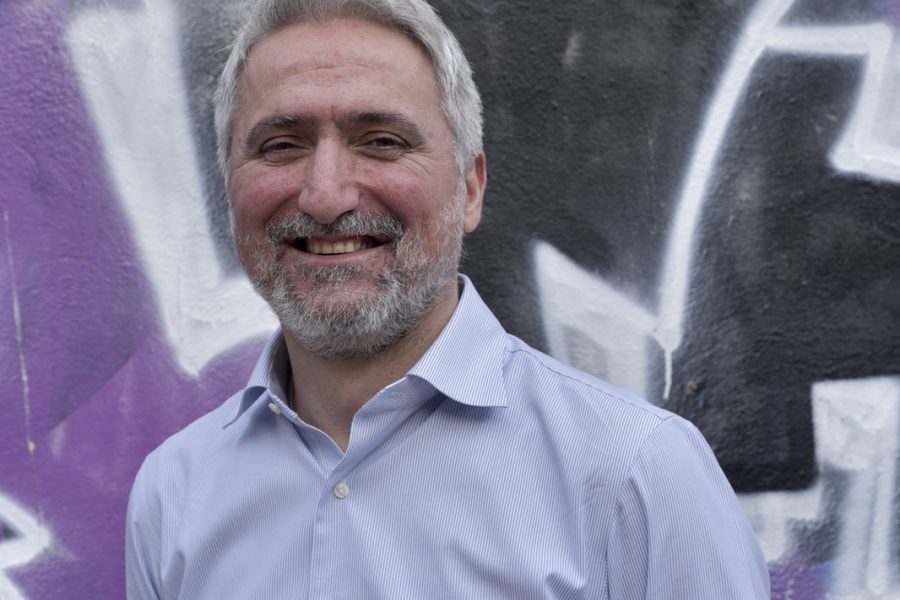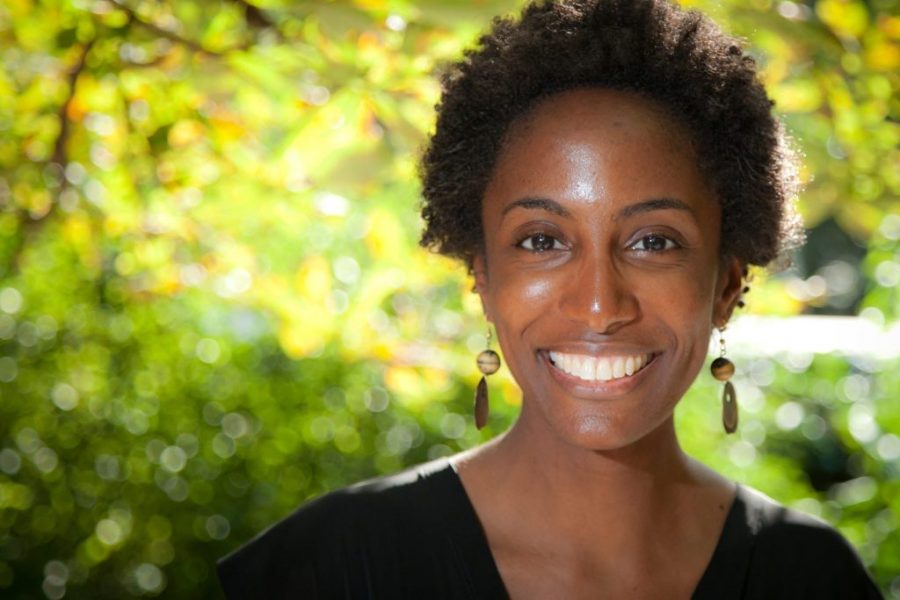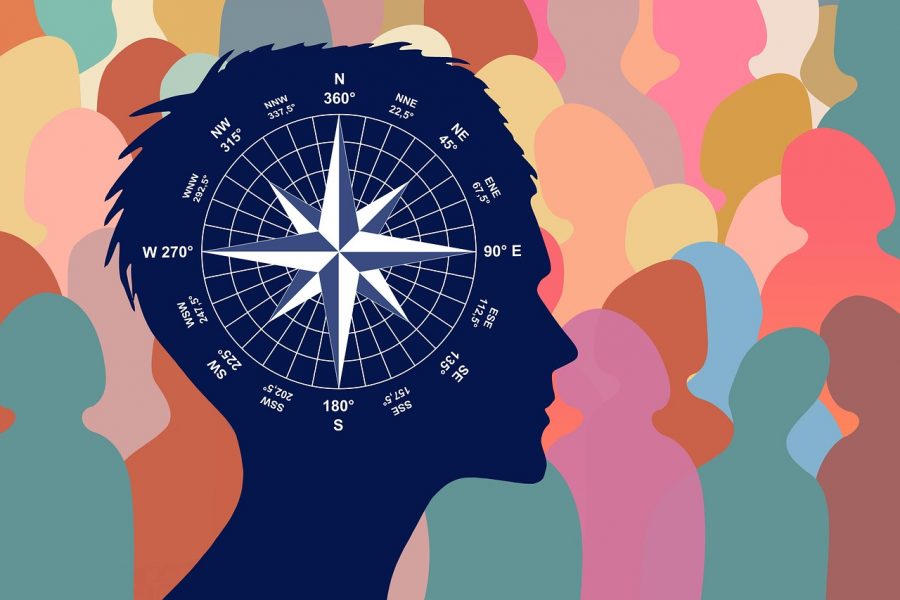I had the pleasure of sitting down with an immigrant change-maker who encourages fellow immigrants from all walks of life to build their lives here in Berlin, instead of just scraping by and letting social norms, visas, or rules rob them of their ability to thrive.
Taylor Coburn is involved in many projects around the city – The Self-Help Contact and Information Center (SEKIS) and the Baumhaus community space, to name a few – and has lived in the city for many years. We got together to talk about the winds that swept her to Germany and the forces that kept her here.
Walter Phippeny: Where are you from originally?
Taylor Coburn: I was born in New Jersey, USA, and I lived there till I was two. I then moved to Maryland where I lived till I was 18. And then Germany when I was 18 to live with my dad in November 2007.
WP: How did your dad get to Germany?
TC: My dad got to Germany because he was in and out of rehab with a cocaine addiction. He was a serial entrepreneur in the plastics industry. He and my grandfather were both in the plastics industry.
WP: What do you mean?
TC: I think my dad had a breakaway bottle company at one point, but also my grandfather invented and sold specialty films like the holographic films that you used to see on the Guinness Book of World Records. They were also in the sticker industry in the 90s, making a lot of stickers for Disney. My grandfather invented this hologram-looking thing on stickers. The technology that allows you to make a holographic sticker.
Anyways, my Grandfather had a company in a place called Berka/Werra and the company was called Coburn Europe and he needed to liquidate it and he asked my dad, “You know what, let me send you to Germany, liquidate my company and then let’s see how that goes.” And so my dad came over here, I think in the year 2000. Before there was the Euro. And he shut down that company and then he found this small town called Greiz, where he was having a good time, and he met his third wife. He told my grandfather, “I’m happy here, I want to stay”. My grandfather knew the inventor of the glitter cutting machine; so he had the glitter cutting machine and the blueprints for it. He said, “Well, let me send you these glitter machines and see what you do with them.”
My dad was looking to buy an old GDR factory that made plastic tablecloths, but that didn’t work out. Then he ended up buying a house with a barn and he got the glitter machines and he asked all the engineers that he met in the tablecloth factory to come work for him, to reverse engineer this glitter machine. They started producing glitter, becoming the first to produce glitter and glitter machines in Germany.
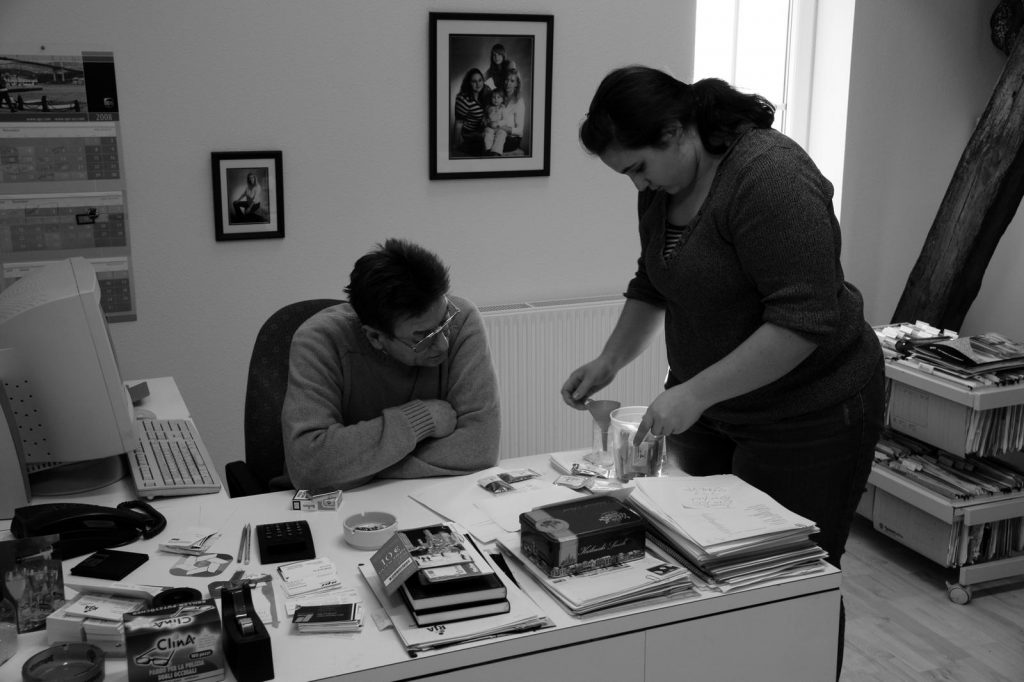
Before that, it was a proprietary machine for a company based in New Jersey called Meadowbrook. They used to have a monopoly on the glitter manufacturing world. My dad started his factory and he ended up becoming quite successful with these German engineers: good quality glitter cutting machines. And he started selling them to India and China and also selling precision cut glitter. It was weird though; he made his own competition by selling the machines so well. By the time I got here, it was a fully fledged business with about 15 to 20 employees.
When I was 18 and struggling with depression, binge eating, and just feeling lost in life – because I had a tough upbringing with my mom in Maryland – my dad invited me to come. He said, “I’ll get you a plane ticket, I’ll get you a passport – just come over to Germany! Come work in my glitter factory, learn some German, and we’ll go from there.” So, that’s why I came in the end. I was escaping a life that was going nowhere fast.
WP: How long in total did you work at the Glitter Factory?
TC: I worked there for a good five years – from the end of 2007 until the end of 2012 – but by the time 2012 came, I was studying in Berlin and I was only working part-time remotely doing some marketing stuff. My dad had me start with cleaning the toilets and then actually working in the manufacturing plant. So I was screening the glitter – actually, screening out the waste. Even though the room was set to be quite climate controlled, it didn’t always work out. There would be a lot of waste in the glitter. We also had a screening process, and that was my first job, to screen out the waste and package tons of glitter into these 25 kg boxes… orders would usually start with 25 kilos minimum.
WP: I can imagine after doing that for a little while… Maybe studying sounds like a good idea.
TC: Oh yeah! I moved from there to doing some bookkeeping, designing the cosmetic glitter line, sample cards, and also planning trade shows. I would plan the stand where we would go and market things, and, through that, I started learning about international business. I started to recognize, “oh I like this accounting thing! I’m not as bad at math as I thought” and I got the hit, like I really want to go to school. I really liked learning and I was learning while I was doing.
I told my dad that I wanted to go to school but somewhere here in Germany. I had this dream that I wanted to study at a German university. It was free, and dad said: “Okay, you do all the work, and then I’ll support you financially and everything.” I didn’t get into any German universities because there was no “uni assist”, and I had to go to Chemnitz, to the Kulturministerium where they reviewed all my documents. They basically concluded I had the equivalent of a German fourth grade level math in my high school diploma – and they said, “ You can’t start any degree program in Germany with this.”
I began my search for a private university and I found one in Heidelberg called Schiller International University. It was accredited, and at the end I would get an American degree. I applied and I got in and I studied there for a year. But in that year, my dad got really sick. He was diagnosed with a heart condition called cardiomyopathy, which the doctor said was probably due to his heavy cocaine usage. I didn’t want to be far away from my dad or my boyfriend at the time who worked for him. And I was kind of feeling iffy about the accreditation of the Schiller degree.
I looked into Berlin and, with my one year that I did at Schiller, there was another American private college – Touro University Berlin – it was Jewish, and their main campus was in New York City. They had German accreditation and, because of the year I did in Heidelberg, they said, “We can accept you into the dual degree program.” So at the end of that program, I would have both a Bachelor of Science in Business Administration in America and a Bachelor of Arts in Business in Germany.
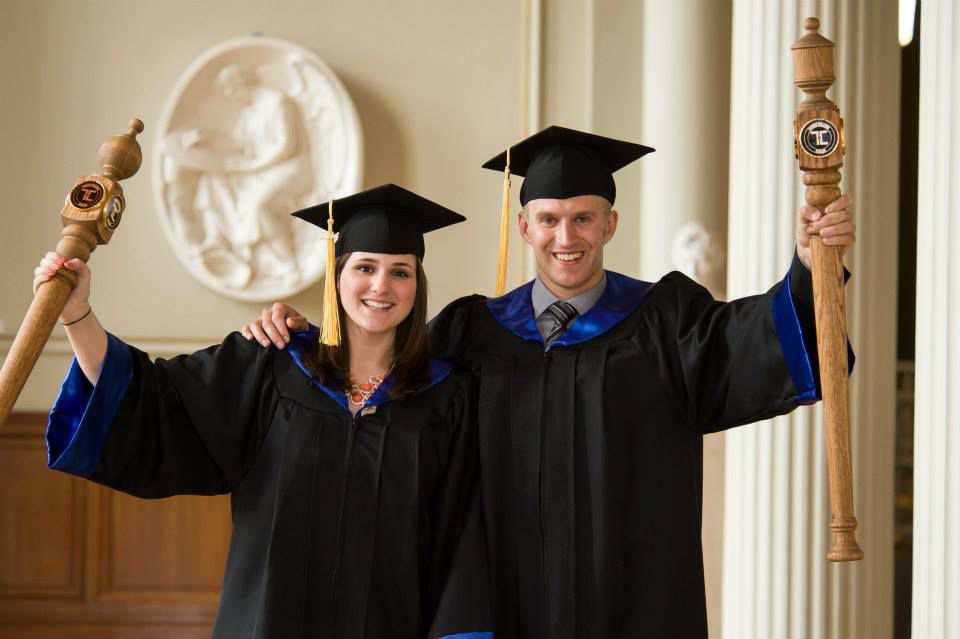
“I’m doing that!”, I thought. I knew I wanted to get a masters at a German university. It was my big dream and goal. So Berlin was about studying. That’s ultimately why I came here at the end of 2011. But also every time I’d come to Berlin I loved it, loved the vibes. I just, I got really happy here in Germany because the quality of life was really high for me. Just more movement, hiking and rock climbing with my boyfriend, healthier food… At one point, I remember realizing that I had just forgotten about my antidepressants some psychiatrist gave me in the US.
WP: So by the time you came to Berlin, you were already pretty well acquainted with German culture and language and you could get around okay. What were the challenges that you still had when you first came to the city?
TC: When I got to Berlin, it was more about figuring out student life, and I had no community here; I knew no one. I just had the college that I was going to go to. My German was pretty good at this point, but it wasn’t perfect when I look back now. I ended up learning most of my German from the internships I was getting the entire time I was studying in English to work in corporate finance, which is kind of like the next chapter if we want to go into that.
Because that’s when my German really improved. I never took a proper German course. I always learned it as I went along and enjoyed it very much.
In the early years I actually spoke the dialect of Vogtland. Greiz is in Vogtland. It’s the pearl of Vogtland, actually. And I had a mixture of, like, Sächsisch and Vogtlandlisch because I was hanging out a lot in Elbsandsteingebirge (in Sachsen) with my boyfriend in those early years.
We were going there, like, every other weekend to hike and rock climb. He and I had almost our own language.
I remember one of the first weekends when I was living here in Berlin, he came here to help me move in. And we were in the MediaMarkt in the Wilmersdorfer Straße. We were bickering back and forth and there were three people who had gathered around; they were so amazed at my German, but they could also tell I was American.
The dialect has gone away since I’ve lived in Berlin so long; I started working in corporations speaking Hochdeutsch. I was working in accounting and auditing, which was mostly only German people because of German tax law.
WP: In your opinion, a lot of immigrants come to Berlin and they talk about how difficult it is. But when you look at the current situation, you compare this to your own experience and you’re all like, “you don’t even know!”
TC: Yeah, they don’t know the half of it because I got here before smartphones. I carried around a German-English dictionary with me. If I drove somewhere, it was still the time of printing out MapQuest, you know? I mean, we didn’t even have a TomTom, which was just gaining in popularity.
WP: You’re talking to someone born in 1976, right? I mean, I lived in Paris in 2000. I had a pocket book of Paris maps on me at all times. My host mother said, “you need to buy one of these!”
TC: Yeah, you know, as we continue with the story, I want to highlight this uni-assist thing. Before, you had to get a notary to notarize your higher education documents; now, they usually go through this uni-assist program to get their documents recognized from outside of the country. You know? You just scan it and upload. You don’t even need it to be notarized anymore. You can just upload it now. It wasn’t like that back then. Even the Deutsche Bahn, you can log in now and book your tickets. It wasn’t possible back then. You had to buy tickets at the window in an office.
Anyway, I wanted to build this life here in Berlin. I wanted to get my degree and I wanted to get a masters at a German university and become a top-notch corporate finance lady. That was my big goal and, in total, it spanned over a decade. And I had my dad’s voice ringing in my head, “You need to be an independent woman. You’re going to be CFO.” And so, like every little girl wanting to gain the approval of her daddy… I had this dream of being CFO of the Glitter Factory…
WP: Then you started doing internships. Right?
TC: About three months into my new life in Berlin, my dad suddenly died in his sleep on his couch. I received a call after Monday morning marketing class from one of his factory workers who told me to sit down and that he was dead.
He and I had been arguing over some things in the months leading up to this and I was awaiting his call that morning to talk to him upon his return from the USA, where he was putting my Nana’s affairs in order even though he wasn’t supposed to fly because of his heart condition.
Besides going back to Greiz to make sure my dad’s body was put in a fridge, to inform his ex wife and all of my siblings, as well as start planning his funeral all in a foreign language, at the age of 21… I had an even harder choice to make: do I stay or do I go back to the US?
I decided to stay. To pursue my big goal and make sure I became that independent CFO woman my dad was always telling me to be.
And the next hardest step was figuring out my visa… My visa was based on the glitter factory job.
But I didn’t know what to do because my brothers and I couldn’t see eye to eye on things and I didn’t want my brother, who took over the factory, to dictate my life by being the one who gave me the job that justified my visa.
I decided to switch to a student visa, which I didn’t know at the time was a bad move. The Ausländerbehörde tried to warn me, because I only had like one more year, and then they would have given me permanent residency.
But I switched to a student visa. All six years after that didn’t count toward my permanent residency, which I didn’t get until 12 years in.
Then, when I finished my master’s, I spent a few years switching work visas with every job change I made.
WP: Let’s talk about what you’re doing now. What are you doing now in Berlin?
TC: Okay. Well…
WP: Take it where you want.
TC: Yeah. Because it’s important. You know? Why is it important? It’s important because I know there’s a lot of immigrants in this city, and it has to do with what I’m doing now, that struggle with stress and depression and anxiety because they’re stressing so much due to a lack of orientation. And they feel uncertain about their future due to visas, jobs, language and getting therapy, right? I have a lot of experience in all of this as is evident in the story I just told you.
When we talk about what I am doing now – we have to start in March 2020 when the global pandemic set in and I HAD to sit in my own four walls and be with myself for the first time in ages.
It was in those months that I woke up to how much I’d been living my life for other people instead of for myself… my higher self.
I did a great job with my studies, getting straight As and climbing the corporate ladder with many big-name companies on my CV… but I still wasn’t fulfilled or at peace with myself.
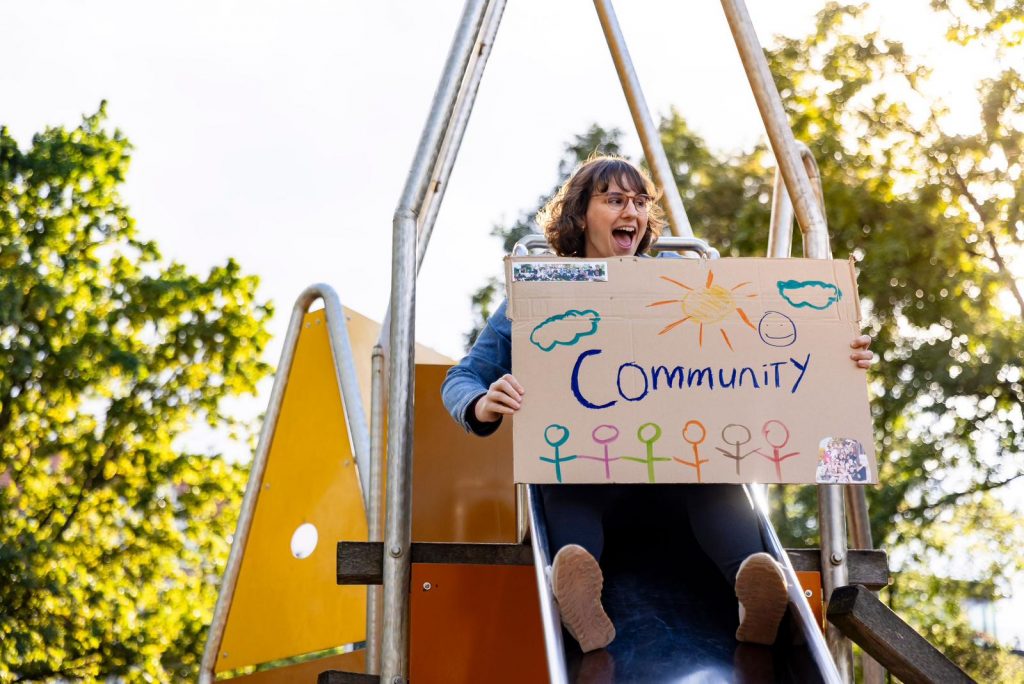
I even found an English-speaking therapist during my bachelor studies… but I went around and around in circles with her and in my group therapy with the same behavioral patterns and results in my life… feeling alone and unfulfilled.
And so, I saw in those lockdown months, while exploring online sharing circles from Berliner immigrant communities like Grrl Gang Berlin and Berlin Boss Babes, that I’d been living very out of alignment with my truth… chasing external validation in the form of money and status and, worst of all, validation that would never come from my dead dad.
My finance career was something to be proud of… I got to get to know myself and also learn that working for a paycheck, a visa, or any other form of belonging to scraping to get by was NOT my cup of tea.
And I had already despised corporations since college because they make up problems and convince us of them and then sell us products to solve those problems that we could’ve come up with on our own in our communities and all been better off.
So, in realizing that I’d fallen very much out of balance – focusing only on the external, belonging, being successful in the way I felt Germany would accept me as successful – I made the decision by the end of 2020 to scrap my finance career and go get involved in moving energy for a more socially sustainable city…
WP: That’s a lot to take in. The city itself offers difficulties. But you’re talking about discovery inside of discovery. Go on!
TC: The way that all manifested was that, step by step, I started to discover my neighborhood and all the parts of Berlin I’d missed out on because I was so focused on surviving: money, status, visas, etc… focused on what I could take and get instead of give and experience with others.
The pandemic was a really positive and transformative time for me.
I discovered the garden behind the Charlottenburger Palace for the first time in the 10+ years I’d been living in Berlin.
I even found a goat farm in a Hof in my neighborhood – completely run by the citizens of my Kiez.
I rode my bike all over, got a dog, started facilitating journaling and sharing circles, got a certificate in transformational life coaching, worked with several coaches to strengthen my leadership skills, and slowly but surely my next career was budding from the soil…
A big change came when I decided to make a coaching group in my neighborhood called Mindfulness for Mental Health. This group eventually needed a quiet and protected space – which I found when I discovered the Charlottenburg-Wilmersdorf Peer Support Group Contact Point (SEKIS) in the Bismarckstr.
My group got a room through them and a spot on their peer support group database by the end of 2022.
And since then, I’ve gotten more involved with SEKIS, serving their mission by supporting their database migration, facilitating the establishment of depression support groups, giving workshops for mental health, leading a traveling exhibition to this year’s project: Thriving Together… making SEKIS more visible and accessible for internationals via the English language.
This project brought me many connections and I started serving more initiatives in the city working to make Berlin and beyond a sustainable home for all of us…
I met a private network of Women in Migration who led me to WahlheYmat Talks – where I picked up a mic and found myself here giving this interview after already getting to share my perspectives with other struggling immigrants at the WahlheYmats Open-Mic talk and a panel discussion with Stiftung Zukunft.
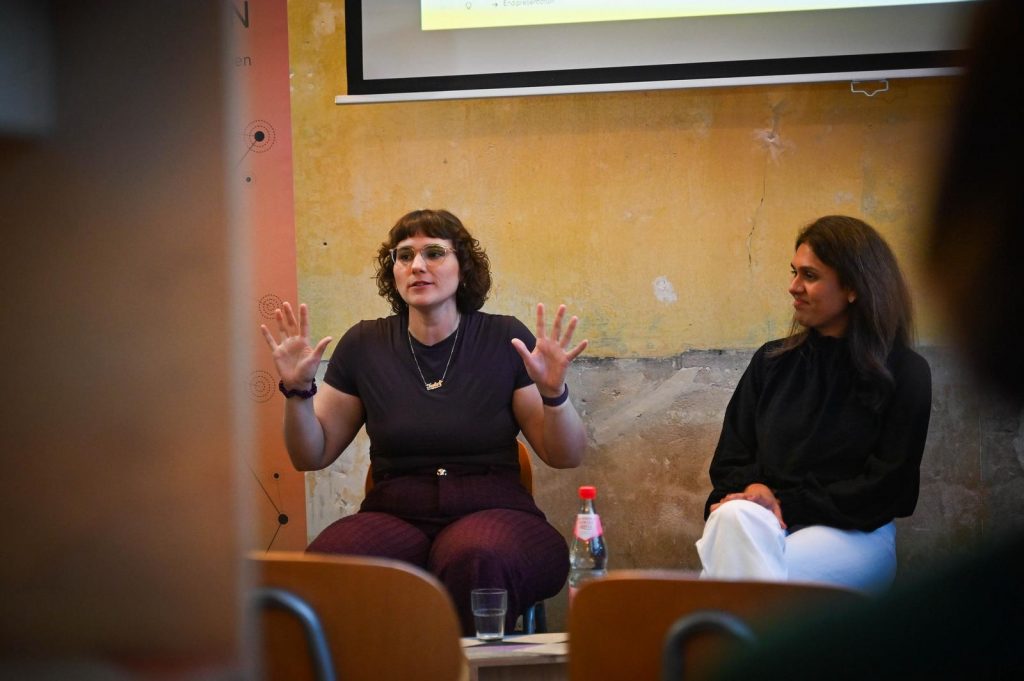
And earlier this year, I came across Das Baumhaus… an indoor treehouse built by an African American, Native American dude from the 70s who has successfully created a space that is the epitome of self-determination, service, and volition as well as sustainable living… it was built by 1000+ volunteers and continues to be tweaked and used as a hub for sustainable collaboration. I got to give a workshop and a talk at their Emergent festival in June…
All three of these initiatives are very aligned with my values and my own mission to serve Berliners in taking their ideas for a better shared home from vision to lasting impact.
I believe Berlin will serve as a lighthouse for the rest of the world to take notes from in post-capitalistic times that are upon us in the next decade or so. I am here to serve and aid where I can in bringing us all more together and empowering us all to live from our values and put more of what we love into this world in solidarity with each other, instead of hustling and surviving for the illusion of scarcity.
I’m the financially poorest I’ve been my whole life and the most at peace and fulfilled. I have a real network of great people and amazing places to dwell that make this city feel like home after 18 crazy years of being an immigrant in Germany.
WP: Give me your advice for someone who has just arrived in Berlin, someone who has lived here one year, and someone who has lived here four years.
TC: For someone who has just arrived: if you haven’t already, take all the time you need to get clear on what you want to get out of this experience. Ask yourself what’s going to be most important to you when your Berlin chapter has ended or matured far into the future. Who do you want to be in a city full of opportunity and different lifestyles? This is your vision and it’s something you should revisit as you create it to see how it’s evolving while you look at what you’re learning and who you’re becoming when internalizing those learnings. For anything you want to do – there is a way – a visa, a club, a group, a company, etc. Choose what’s true for you and the rest will fall into place… it won’t be easy, but it’ll be worth it!
For someone who’s been here for four years…I’d ask: are you living the life that’s true for you or did you let your past or other distractions take you somewhere else? Where do you want to go from there? Do that.
For everyone: I’d say don’t move here if you don’t want to respect the natives and harmonize with them. Especially if you don’t have a real desire to learn the language…I love learning German…and it afforded me many enriching opportunities…and those who come here to force others to speak their language or to only benefit from the social infrastructure – I ask you to re-think that and see where you can serve both yourself and the greater good that is our home, Berlin and leave the social benefits for a time when you really need them, or for someone else more in need.
You can do more than you think you can and are already further along than you think as well.
| Taylor Coburn is a Berlin-based change-maker and educator whose 18-year immigrant story is a powerful testament to the pursuit of self-determination. For over a decade, she focused heavily on external success in corporate finance, realizing in the last five years that she had fallen dangerously out of balance while merely surviving on external validation. Having successfully pivoted to a life of service to her higher self and the greater good, Taylor now uses her experience to guide others in creating a life that is authentically aligned, helping Berliners turn their personal vision into a lasting, positive impact on our shared home. She passionately works with community projects, organizations, and initiatives like SEKIS, Das Baumhaus, and WahlheYmat to ensure everyone moves from merely scraping by to actively thriving together. |

